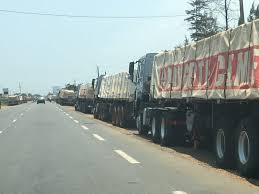When the authorities in Abuja announced the closure of their border with Nigeria’s neighbour Benin in August, many Ghanaian traders who depend on the Abidjan-Lagos route to ferry their goods and services did not bat an eyelid, thinking it was going to be short-lived.
Fast-forward to November and the border still remains firmly shut and traders based in Ghana who first reacted with incredulity at the move say they have completely lost patience with Nigeria and wants their own government to retaliate in like manner even if this risks a trade war between the two countries.
Although Ghana and Nigeria do not share a land or maritime border, traders, drivers and other business concerns depend on the Abidjan-Lagos Highway for overland access to markets in West Africa.
The closure of the Nigeria-Benin border on August 21 has made passage impossible.
Stranded Ghanaian drivers are beginning to agitate against Nigeria, blaming the government of Africa’s biggest economy for the harsh conditions they were going through as a result of the closure.
For instance, the Kasaprko Company Limited, a local beverage manufacturing company based in Ghana with supply chains stretching into Nigeria and Benin came out to say it has lost $2million since the border was shut.
People involved in the informal trade sector especially Ghanaians and Beninese are also complaining that they are also feeling the pinch.
A series of meetings had been convened between officials of the Ghanaian and Nigerian governments to end the closure but there had been no positive outcome, sources have told the African Press Agency.
The Nigerian authorities say they closed the border to prevent the entry of contraband goods from neighbouring Benin, including rice.
The smuggling had caused Nigeria losses in revenue running into tens of millions of dollars, they claim.
Ghana, they say, was not the target although the implications for its citizens using the Abidjan-Lagos route has been incalculable.
Considering the Ghanaian drivers stranded at the Seme-Krakue border town between Nigeria and Benin, President Nana Addo Dankwa Addo last week made a donation of CFA 450,000 toward alleviating their plight.
The money was to assist them to clear expenses they had incurred as a result of the border closure.
However, the drivers claimed that the money meant to be shared among them would leave them with a paltry CFA5, 000 or GH₵40. 00 each.
They said while they appreciate President Akufo-Addo’s intervention in monetary terms, it was far from enough to assuage their plight.
They said the most important intervention for them right now is one that would restore their ability to move their trucks from what to them resembles a confiscating yard.
They are, therefore, calling on Addo’s government to intervene so that their trucks can be on the road once again.
And their plight does not look like going away any time soon because Nigeria recently announced that the closure of their border will be lifted on 31 January, 2020.
The outspoken President of the Ghana Union of Traders Association (GUTA) contended that the announcement prolonging the border shutdown is proof of weak ECOWAS protocols that are not even respected even if they are being applied by member countries.
In his opinion they simply lack bite.
Last week GUTA went into offensive mode, instructing the closure of some shops belonging to Nigerians and Chinese traders but they were stopped on their tracks by the government in Accra which is reluctant to provoke a trade war with Nigeria.
This has left the GUTA fuming as its president accused the government of not showing serious commitment to ending the crisis, save face and put the truckers and traders out of their prolonged misery.
“If Nigerian authorities are saying Nigeria first, Ghanaian authorities should also say Ghana first”, Dr. Obeng told the local press.
As the crisis drags on into its third month, many Ghanaians are of the view that Nigeria wants to start a trade war with Ghana, even if its authorities use conciliatory words to mask this.
But President Akufo-Addo and his government have opted for diplomatic tactics, instead of an out and out combative or retaliatory approach which will cause further complications in relations with a very important player in the West African sub-region.
DAP/as/APA


